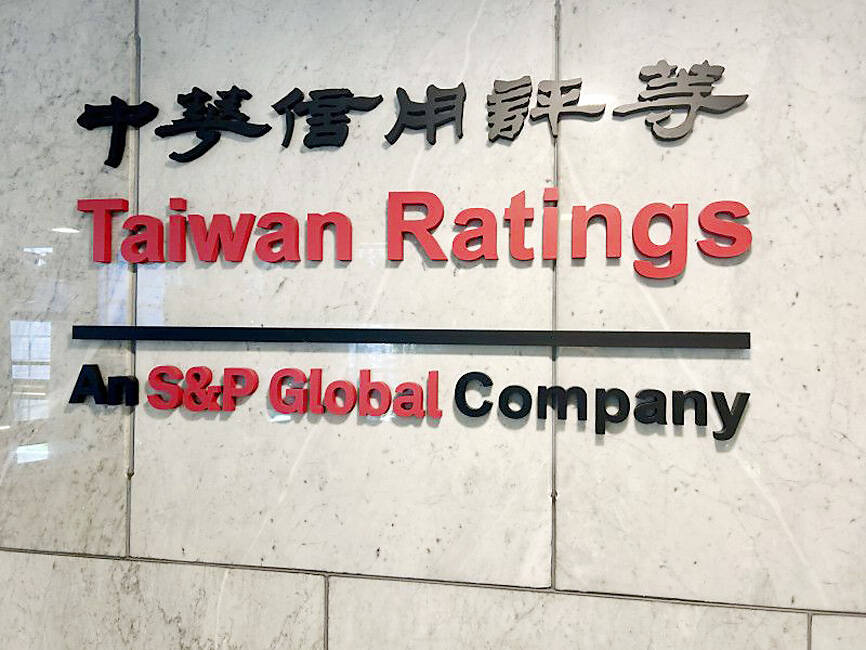Taiwan Ratings Corp (中華信評) has upgraded its GDP growth forecast for Taiwan this year to 3.3 percent from its 2.4 percent estimate in March, citing robust first-half momentum fueled by a resilient technology sector and front-loaded export orders.
Despite the upward revision, the ratings agency yesterday cautioned that the economy would face mounting headwinds in the second half.
Taiwan’s economy remains vulnerable to external shocks due to its trade-dependent structure and exposure to global supply chains, Taiwan Ratings credit analyst Joe Lin (林顯勍) said at a news conference in Taipei.

Photo: Wu Hsin-tien, Taipei Times
“Export strength seen in the first half is likely to taper off as clients complete inventory restocking and early shipments intended to get ahead of anticipated US tariff hikes begin to fade,” Lin said.
The New Taiwan dollar’s sharp appreciation could also erode local exporters’ profit margins and reduce their competitiveness across tech supply chains, Lin added.
The local currency’s exchange rate against the US dollar is projected to stabilize at about NT$30 this year, as tariff-related volatility subsides, he said.
Washington is expected to announce further tariff details this week, as a 90-day waiver ends, a development that could influence Taiwan’s export performance.
Outside the technology sector, performance across traditional industries is mixed.
Taiwan Ratings credit analyst Beatrice Chen (陳靜儀) said the chemicals industry remains under pressure, with recovery lagging earlier forecasts.
China’s stimulus efforts are unlikely to provide meaningful relief, given underlying structural demand weaknesses, she added.
Steelmakers are also under strain, as subdued global demand, persistent overcapacity in China and rising exports weigh on prices and profitability of Taiwanese peers, Chen said.
In contrast, the cement industry is showing signs of stabilization. Improved pricing and production discipline in China, and lower coal costs are helping shore up margins, she said.
Steady income from non-cement operations and overseas businesses is also supporting cash flow stability, she added.
As for financial services, insurers are facing challenges amid market volatility.
Taiwan Ratings credit analyst Andy Chang (張書評) said that average returns on assets are expected to decline this year.
However, enhanced hedging strategies and regulatory support are likely to preserve the sector’s profitability, he said.
Life insurance premium growth is projected to be about 6 percent this year, driven by demand for US dollar-denominated, interest-sensitive and participating policies, Chang said.

In Italy’s storied gold-making hubs, jewelers are reworking their designs to trim gold content as they race to blunt the effect of record prices and appeal to shoppers watching their budgets. Gold prices hit a record high on Thursday, surging near US$5,600 an ounce, more than double a year ago as geopolitical concerns and jitters over trade pushed investors toward the safe-haven asset. The rally is putting undue pressure on small artisans as they face mounting demands from customers, including international brands, to produce cheaper items, from signature pieces to wedding rings, according to interviews with four independent jewelers in Italy’s main

Japanese Prime Minister Sanae Takaichi has talked up the benefits of a weaker yen in a campaign speech, adopting a tone at odds with her finance ministry, which has refused to rule out any options to counter excessive foreign exchange volatility. Takaichi later softened her stance, saying she did not have a preference for the yen’s direction. “People say the weak yen is bad right now, but for export industries, it’s a major opportunity,” Takaichi said on Saturday at a rally for Liberal Democratic Party candidate Daishiro Yamagiwa in Kanagawa Prefecture ahead of a snap election on Sunday. “Whether it’s selling food or

CONCERNS: Tech companies investing in AI businesses that purchase their products have raised questions among investors that they are artificially propping up demand Nvidia Corp chief executive officer Jensen Huang (黃仁勳) on Saturday said that the company would be participating in OpenAI’s latest funding round, describing it as potentially “the largest investment we’ve ever made.” “We will invest a great deal of money,” Huang told reporters while visiting Taipei. “I believe in OpenAI. The work that they do is incredible. They’re one of the most consequential companies of our time.” Huang did not say exactly how much Nvidia might contribute, but described the investment as “huge.” “Let Sam announce how much he’s going to raise — it’s for him to decide,” Huang said, referring to OpenAI

The global server market is expected to grow 12.8 percent annually this year, with artificial intelligence (AI) servers projected to account for 16.5 percent, driven by continued investment in AI infrastructure by major cloud service providers (CSPs), market researcher TrendForce Corp (集邦科技) said yesterday. Global AI server shipments this year are expected to increase 28 percent year-on-year to more than 2.7 million units, driven by sustained demand from CSPs and government sovereign cloud projects, TrendForce analyst Frank Kung (龔明德) told the Taipei Times. Demand for GPU-based AI servers, including Nvidia Corp’s GB and Vera Rubin rack systems, is expected to remain high,